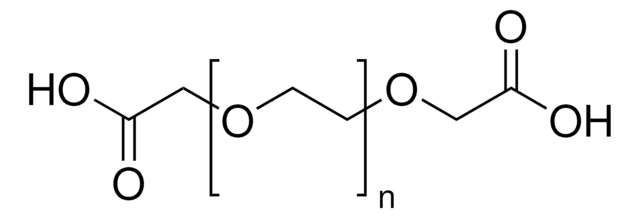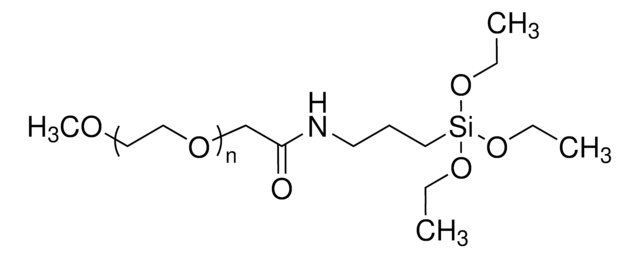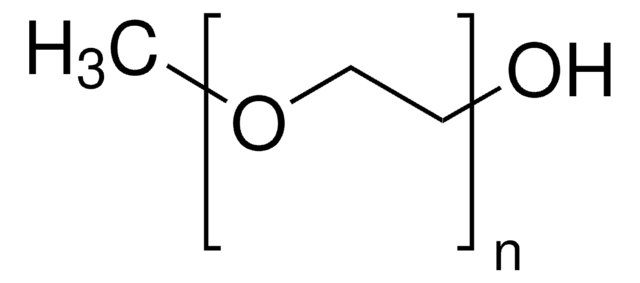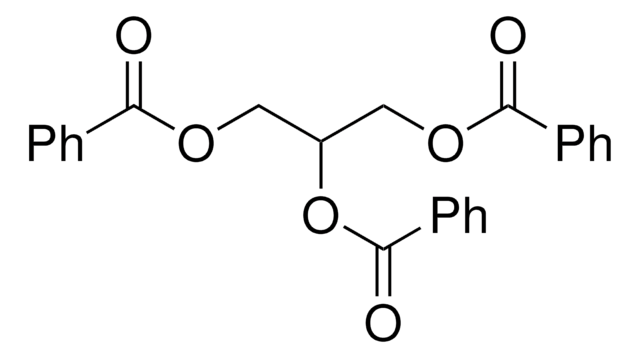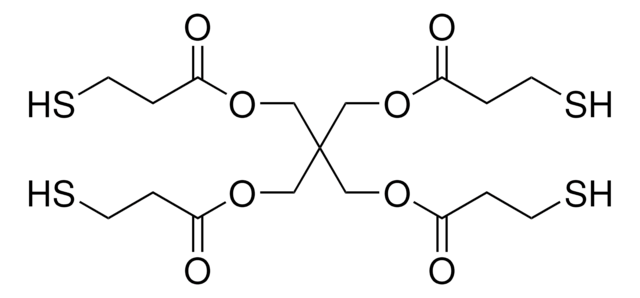450596
Poly(ethylene glycol) bis(2-ethylhexanoate)
average Mn ~650
Synonym(s):
PEG bis(2-ethylhexanoate)
Sign Into View Organizational & Contract Pricing
All Photos(1)
About This Item
Linear Formula:
CH3(CH2)3CH(C2H5)CO(OCH2CH2)nO2CCH(C2H5)(CH2)3CH3
CAS Number:
MDL number:
UNSPSC Code:
12162002
PubChem Substance ID:
NACRES:
NA.23
Recommended Products
mol wt
average Mn ~650
Quality Level
refractive index
n20/D 1.453 (lit.)
viscosity
50 cP(25 °C)(lit.)
mp
−48 °C (lit.)
solubility
H2O: insoluble
hexane, toluene, ethanol, and acetone: soluble
density
1.02 g/mL at 25 °C (lit.)
SMILES string
OCCO.CCCCC(CC)C(O)=O
InChI
1S/C18H34O4/c1-5-9-11-15(7-3)17(19)21-13-14-22-18(20)16(8-4)12-10-6-2/h15-16H,5-14H2,1-4H3
InChI key
XCQFTFZCTGZCNP-UHFFFAOYSA-N
General description
Poly(ethylene glycol) bis(2-ethylhexanoate) (PEG-EH) is an ethylene acrylic elastomer that can be used as a low volatile plasticizer.
Application
PEG-EH can form a blend with polyvinylidene fluoride (PVDF) which can be used in the preparation of electrolytes for lithium batteries. It is also used as an additive for the development of ionization methods for mass spectroscopy.
Features and Benefits
Low volatility and good heat resistance. Compatible with a variety of polymers including polyesters and polyamides.
Storage Class Code
10 - Combustible liquids
WGK
WGK 3
Flash Point(F)
Not applicable
Flash Point(C)
Not applicable
Personal Protective Equipment
dust mask type N95 (US), Eyeshields, Gloves
Choose from one of the most recent versions:
Already Own This Product?
Find documentation for the products that you have recently purchased in the Document Library.
Customers Also Viewed
Novel microporous poly (vinylidene fluoride) blend electrolytes for lithium-ion batteries
Wang H, et al.
Journal of the Electrochemical Society, 147(8), 2853-2861 (2000)
Jonathan P Williams et al.
Rapid communications in mass spectrometry : RCM, 21(11), 1693-1704 (2007-05-03)
A rapid method for the characterisation of polyglycol esters and ethers is described which uses accurate mass desorption electrospray ionisation (DESI) quadrupole time-of-flight mass spectrometry (Q-ToFMS). The results are combined with newly developed software which aids the interpretation of product
Klaus E Andersen et al.
Contact dermatitis, 70(2), 112-116 (2013-10-25)
Allergic reactions to spectacle frames are not unusual. A patient had a reproducible strong allergic patch test reaction to scrapings from the plastic material, and negative patch test results with available spectacle frame chemicals. To identify the culprit allergen in
A novel all-solid electrolyte based on a co-polymer of poly-(methoxy/hexadecal-poly (ethylene glycol) methacrylate) for lithium-ion cell
Zuo X, et al.
Journal of Materials Chemistry, 22(41), 22265-22271 (2012)
Research and development topics in Analytical Chemistry. Investigation of a cation exchange separation method for the determination of transition metal ions in anaerobic sealants
O'Dea P, et al.
Anal. Proc., 28(3), 82-84 (1991)
Our team of scientists has experience in all areas of research including Life Science, Material Science, Chemical Synthesis, Chromatography, Analytical and many others.
Contact Technical Service
